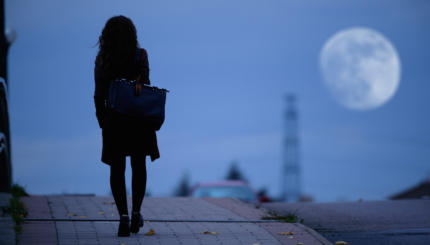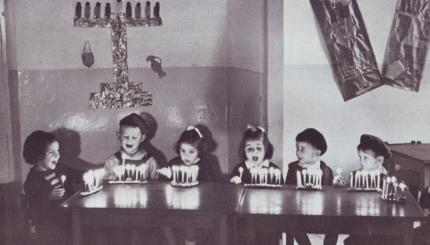Is it just me, or lately do there seem to be more clouds of confusion and despair obscuring hearts, minds, communities and public discourse? As I write these words, even my East Coast home is shrouded in a bizarre meteorological June gloom more reminiscent of coastal California.
Amidst literal and metaphorical cloudy skies, what should spirituality be like when the emotional and spiritual weather goes gray?
Some imagine spiritual life is (or should be) light and bright. Certainly, it can be comforting to think so, and Jewish thought is full of allusions to spirituality’s sunny side. Nachman of Breslov famously taught that the greatest mitzvah is to be joyful always. Zusya of Hanipol reputedly never felt anything bad happen to him, however impoverished and unpleasant his life seemed. To Nachman and Zusya, positive attitude was the key to good living.
Perhaps, but spiritual life isn’t always bright and sunny. Even the “always joyful” Nachman taught that all people suffer, so we must break our hearts every day for an hour to stay real about real-life suffering.
And yet, how many still imagine that true spirituality is all light, no darkness? This idea can drive a damaging dynamic called spiritual bypassing. To Robert Masters, spiritual bypassing “is a very persistent shadow of spirituality” rarely recognized but often present. In spiritual bypassing, beliefs and behaviors presume that spirituality is only happy and optimistic, creative and comforting. What’s dark, unhappy or scary gets relegated to the imagined unspiritual – or even the ungodly.
Spiritual bypassing raises three serious problems. The first is theological: the unity we call “God” is so only if light and dark, joy and grief, creation and destruction, all can claim their full authentic share of spirituality’s mantle. After all, God “forms light and creates darkness, makes peace and creates evil – I, God, do all these things” (Isaiah 45:7). If so, then spirituality stripped of negativity, sadness and darkness is hollow, brittle and false – no more real than one side of a coin. Stated otherwise, a real worthwhile “God” also must be amidst shadow, cloud and darkness.
The second problem is that spiritual bypassing can paper over life’s problems and clouds with feel-good pablum, momentarily comforting but ultimately unhelpful and even counter-productive. A joy-only “spirituality” can inhibit emotional and spiritual growth by isolating spirituality from real life challenges and behaviors. Such “spirituality” can be a barrier to real personal growth.
The third problem is that spiritual bypassing can have the perverse effect of impelling people who experience darkness to believe themselves unspiritual amidst dark moments, even to believe that something is wrong with them for feeling cloudy. This perverse dynamic can alienate people from spirituality and their own true selves in the false name of spirit.
Perhaps it’s no accident that a cloud was our wandering forebears’ guide on their desert journey. From this week’s Torah portion (Beha’alotecha), ancient Israelites knew to stop when a cloud rested on the Mishkan, and they broke camp to move forward only when the cloud lifted (Numbers 9:15-17). However long the cloud lingered – even for a year – the people waited. To the Sforno (Ovadia ben Ya’akov, 1475-1550), navigation by divine cloud meant that the people – as individuals and as a society – had to let go of control and planning. Only then could they be led to the Promised Land.
It’s meaningful that a cloud was the people’s guide. When the Psalmist wrote that the cloud spoke to the people on their journey (Psalm 99:7), did it say “let go of control“? At a minimum, our ancestors must have heard, “Stop and wait!” Life’s clouds are signals to stop and pay attention.
A mystical read would go further. Using Zohar to interpret Numbers 9:19, “When the cloud dwelled atop the Mishkan for many days, the people took care of the indwelling presence within, becoming guardians for the transcendent – and they did not need to travel.”
Darkness isn’t un-spiritual. To the contrary, clouds focus us inward rather than outward, linking us with what’s truly transcendent, without running from what seems dark. Real spirituality can and must hold both shadow and light, grief and joy, destruction and creation, cloud and the sun. As Barbara Brown Taylor put it in Learning to Walk in the Dark:
The way most people talk about darkness, you would think that it came from a whole different deity, but no. To be human is to live by sunlight and moonlight, with anxiety and delight, admitting limits and transcending them, falling down and rising up. To want a life with only half of these things in it is to want half a life, shutting the other half away where it will not interfere with one’s bright fantasies of the way things ought to be…. [W]hen we run from darkness, how much do we really know about what we are running from? If we turn away from darkness on principle, doing everything we can to avoid it because there is simply no telling what it contains, isn’t there a chance that what we are running from is God?
None of this should glorify depression, a real and potentially serious illness. Anyone who suffers from depression should please seek professional support, and never imagine that spirituality alone should replace expert medical care. Clinical depression aside, real spirituality must make room for life’s darkness, lest spirituality be false or feeble. And given today’s world, it’s long past time to get past facile feel-good notions of spirituality that don’t really improve our world. Masters continues:
Happily, the honeymoon with false or superficial notions of spirituality is starting to wane. Enough bubbles have been burst; enough spiritual teachers, Eastern and Western, have been caught with pants or halo down; enough cults have come and gone; enough time has been spent with spiritual baubles, credentials, energy transmissions, and guru-centrism to sense deeper treasures. But valuable as the desire for a more authentic spirituality is, such change will not occur on any significant scale and really take root until spiritual bypassing is outgrown, and that is not as easy as it might sound, for it asks that we cease turning away from our pain, numbing ourselves, and expecting spirituality to make us feel better.
When life’s clouds come, we needn’t chase them away or run from them for spirituality’s sake. Just like for our desert ancestors, clouds can prompt us to stop and turn inward. We needn’t let the allure of light and feel-good spirituality distract us from the fullness and complexity of real life, real people, and real journeys, in all their stops and starts. We can cultivate the courage and patience to be ever more fully present to both light and shadow – all part of the Oneness we call God.




